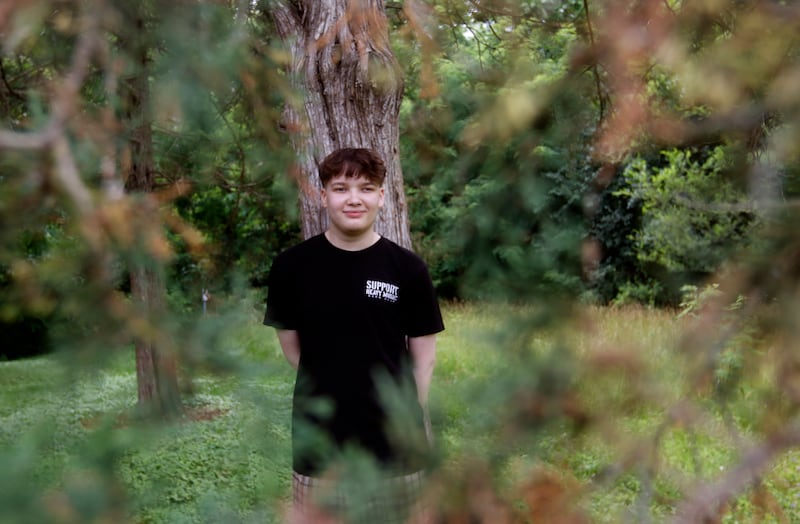Joshua Smith’s welcome-home party has to be remote. The McHenry-area teenager’s system is getting used to the massive amount of immunosuppressant drugs he’s taking now that he has a new heart and kidney.
“I wanted a big party, but I really can’t have that for basically a year,” Smith, 17, said.
Instead, a homecoming parade is set for 1:30 p.m. Sunday, July 20. Cars can start lining up at 12:30 p.m. in the Whispering Hills Community Center parking lot at 4706 Jeffrey St. in Johnsburg before parading past the family’s home at 4405 Elmleaf Drive. in McHenry. Information about the parade can be found at the Facebook page Keeping Joshua Strong.
His actual homecoming was June 24. Since mid-October, he had been at either Ann & Robert H. Lurie Children’s Hospital of Chicago or Chicago’s Ronald McDonald House.
“He’s not able to be around a lot of people,” added his mom, Jennifer Canady. “But they can see how great he is doing by driving by the house with decorated cars and signs to show their support and how great he is doing.”
The family has known since he was an infant that a kidney transplant was likely to be needed at some point. Smith was born with a double-outlet right ventricle. With three heart chambers instead of four, his heart was not pumping oxygenated blood to his organs correctly. As an infant, Smith spent his first 5½ months in the neonatal intensive care unit and having surgeries to correct the condition.
“His kidneys took a hard hit from that,” Canady said.
:quality(70)/cloudfront-us-east-1.images.arcpublishing.com/shawmedia/6TVX34S435E4ZMMJ72CV3QYG5M.jpg)
It’s not unusual for infants born with Smith’s condition to need a kidney transplant later, said Dr. Priya Verghese, the pediatric nephrologist who performed his kidney operation. “The heart is the pump that sends oxygenated blood to every organ in the body. For a kidney to do well and survive, it needs oxygen, and in Joshua’s case he got double hit: heart dysfunction and his kidneys had low blood flow and stopped working over time,” Verghese said.
The news that Smith was at the transplant point came just before his 17th birthday. He was admitted to Lurie’s in October to start dialysis, prepare for the transplant - and have more surgeries for his heart - when his care team realized how bad his heart had gotten. It was leaking badly.
:quality(70)/cloudfront-us-east-1.images.arcpublishing.com/shawmedia/5HO6KXDDVNBPJFLZCZHXAQNTWM.jpg)
“The heart is like a rubber band: If you leave it stretched out for too long, it gets floppy,” said Dr. Brian Madden, who performed Smith’s heart transplant. “This was probably a mild problem that had gradually gotten worse until he presented with heart failure symptoms.”
Smith was released to the Ronald McDonald House in March, where he stayed with Canady and his sister, Navaeh Smith, for nine days before he had to be readmitted.
The Ronald McDonald House “was such a phenomenal help to our family – to be able to go and rest somewhere and be prepared for the next day. It was such a long road for Joshua, it is beyond words how helpful it was,” Canady said, adding she and her daughter were there “for months.”
:quality(70)/cloudfront-us-east-1.images.arcpublishing.com/shawmedia/I7BG2XI6KFEDXP37CHGLK4CKCA.jpg)
A majority of families staying at the Chicago Ronald McDonald House have infants in intensive care, and the facilities average 80 families a night, said Lisa Mitchell, chief program officer for the Ronald McDonald House Charities of Chicago & Northwest Indiana. Staying at Ronald McDonald House for an extended stay can be tough on teenagers.
“Their preference on how they chose to engage is different from younger kids. We try hard to have something for everyone,” Mitchell said, including basketball and a rooftop garden. Trips to Navy Pier and Michigan Avenue are also common when patients and families are staying there.
Finally, on May 12, news came that a donor heart and kidney were available and surgery was set for the next day. Because the organs came from one donor, Smith also has a better chance that his body won’t reject them, Madden said.
There are often fewer complications after transplants by doing the two together, with less risk of rejection, simply because Smith’s body “is seeing the donor cells everywhere so it is more likely to not reject them,” Madden added.
That donor saved three other lives, too, with the other kidney, liver and lungs going to other patients in need, he said.
Both Madden and Verghese said that fewer families are donating the organs from loved ones who have died, and in the case of kidneys, fewer people are offering to be live donors.
There are a number of theories on why fewer people are offering to be live donors, Verghese said, from health insurance concerns to single-parent caregivers to a rise in obesity.
“It is an incredible gift and donor health after the donation ... they do incredibly well,” she said, adding that can be from the “satisfaction of giving a gift without a bow.”
Smith is feeling better as his body recovers from the surgery, his new heart pumps blood and his new kidneys clean the blood. He hopes to go back to classes at Johnsburg High School this year and graduate on schedule with his class.
There is a GoFundMe, Support Joshua’s Life-Saving Surgeries, to help cover bills, but Smith wants to do more to help other families, too.
“I wanted to do something to help other people ... to help people who can’t afford surgeries, people who can’t work in those hard times. I want to be there to give them support,” he said.
What he’s learned in the last year is that anyone “can get through anything, if you have the courage and the mindset. Sometimes it can be hard, but it will turn out really good if you have the right mindset,” Smith said.

:quality(70)/s3.amazonaws.com/arc-authors/shawmedia/185fbfd8-8216-43d7-8beb-cd8992be6fe5.png)